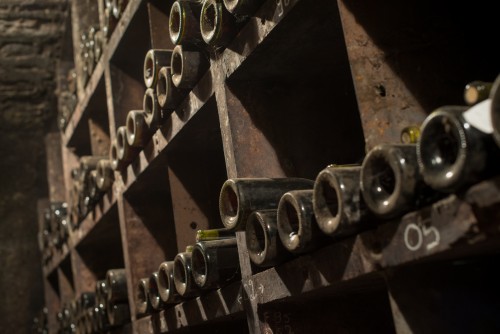Preservation and tasting of wine”
Preamble to the preservation and tasting of wine
 Wine is a living substance that, by definition, is born, lives and dies, and despite what some may say, over which man does not have complete control. With wine, we are constantly (re)discovering.
Wine is a living substance that, by definition, is born, lives and dies, and despite what some may say, over which man does not have complete control. With wine, we are constantly (re)discovering.
Like all living beings, wine’s life, its evolution, can be influenced by intrinsic factors: its structure, its depth, and most importantly its general balance. A wine can improve as it gets older, but this is not always the case.
Moreover, individual taste will affect how well we appreciate wines at different stages of their evolution.
Some love wines in their youth, when they are fruit-forward, full of energy. Others prefer waiting for the wisdom of a wine that has reached its maturity, when all of its personality and complexity are expressed. One must nevertheless remember that a wine is not always the easiest to grasp after just a few years in bottle. A series of open and closed phases may occur before the wine finally settles into harmony.
One must remember that a wine that is closed at any one point in time will not remain closed for the rest of its life, and that this does not prevent it from having an excellent aging potential.
In the cellar, a constant air humidity (around 70%) and only subtle temperature variations between seasons is ideal (if one cannot have a constant temperature all year long). A gentle fluctuation between 10°C/ 50°F and 15°C/ 59°F during the year is not detrimental to a wine’s evolution. However, brusque temperature changes can fatigue a wine and precipitate its aging, thus reducing aging potential.
We guide the vines and our wine by taking into account the influences of the cosmos. As a result, at certain times of the year, on certain days, wines will be closed, or will not be at their best. “Leaf” days, lunar nodes, or lunar perigees, and to a lesser degree “Root” days, are not always favorable to a full appreciation of our wines. It’s up to you to try observing the lunar calendar!
To learn more about biodynamic approaches and concepts : https://fr.wikipedia.org/wiki/Biodynamic_agriculture
If there is an art to winemaking, there is also an art to tasting wine…
A wine needs time to prepare itself, so it is always best to plan ahead for the wines we wish to open during a meal or a tasting.
Haste is rarely met with success; and you will benefit from taking your time. The few exceptions to this rule are some older wines or fragile vintages that offer a more fleeting pleasure that one must seize at the moment, in order to not miss their last breath…
So one should open bottles with sufficient time in advance, a few hours at least, storing them between 16°C/ 60.8°F and 18°C/64.4°C, in a room that is neutral in terms of smell, where they will not be harmed by cooking odors. Once uncorked one should make sure to taste a little of the wine to be sure that it does not have a flawed taste. The cork will be simply set on top of the bottle opening, not pushed back into the bottle. For wines from our domaine that are less than 10 years old, there is no great risk to opening these bottles 8 to 10 hours ahead of time.
Decanting a wine can serve to dispel a reduction that might be too marked in a bottle, but by oxygenating in a fairly violent manner the wine might lose a part of its initial complexity. Again, it’s important to go slowly…



